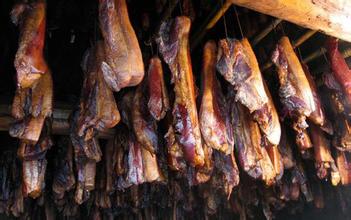To the Miao ethnic groups, Souse Fish and Smoked Meat are more than just food.
对纯朴的苗家人来说腌鱼腊肉,不仅仅是一种食物。
They are part of their lives and memories to be remembered by history.
而且是被保存在岁月之中的生活和记忆。
If we went to school, we had to get up before 4:00 am.
一般我们要是赶课的话,就是早上三四点钟就要起来。
My mum accompanied me at first.
我妈妈早上三四点钟就开始送我。
After we crossed several hills, the day broke.
送我送了几个坡以后,那个天鱼肚白的时候。
She said, go to school yourself.
她就跟我说,她说满女,你自己走吧

It's getting brighter.
现在天快亮了,你就自己走吧,这个天是越走越亮的。
I have some housework to do.
我要回家做事儿去了。
Then I plucked up courage and went to school by myself.
然后我就壮着胆子走。
Souse fish and smoked meat have accompanied the Miao ethnic girl even if she has had a new world.
腊肉和腌鱼曾经陪伴着苗族少女走出一片新的天地。
Huizhou people, who also live in mountains, have their own understanding of souse fish.
而同样穿行在崇山峻岭中的徽州人对腌鱼却有着自己的心得。
Smelly Chinese Perch is a typical Hui dish cooked with strictly selected ingredients.
徽州的臭鳜鱼是徽菜的一个代表菜,现在臭鳜鱼的制作在选鱼方面是相当讲究的。
When peach trees blossom in March and April, it's time to fish.
一定要选用三四月份桃花盛开的季节,这个季节的鳜鱼是最肥的。
Fish caught during this period taste best.
鱼质是最鲜美的时候。
Huizhou is the birthplace of Hui merchants and Huizhou Culture.
这里是徽商故里和徽文化的发祥地。
In ancient times, local residents had to leave the small but populous Huizhou to make a living far away from home.
由于古徽州地少人多,居民们不得不离乡背井走出深山去闯世界,求生存。
The food they carried that were made through air-drying or smoking processes were easy to preserve during a long trip.
而他们在路途之上的食物也不得不经过风干和腌制以便于保存和携带。
For example, "Laba Tofu" is as hard as a discus, but it can be preserved for quite a long time.
比如徽菜里的腊八豆腐虽然像铁饼那样坚硬。
But food would always go bad.
但保质期却可以很长,食物放久了终究会发酵变臭。
Unexpectedly, rotten food have created a new flavour.
不过,久而久之腐败竟然也成为味道的一种。
Stinky dishes, like Smelly Tofu and Hairy Tofu, have become something that distinguishes Hui cuisine.
比如臭豆腐,比如更为极致的“毛豆腐”,嗜臭于是也成为徽菜的一个独有的特征。
The skin of well-salted Chinese Perch is aerugo.
臭鳜鱼腌制好了以后。
The gills appear red.
鱼的表面变成铜绿色,鱼鳃是发红的。
It smells bad, but tastes good.
你闻起来臭但吃起来特别地香。












